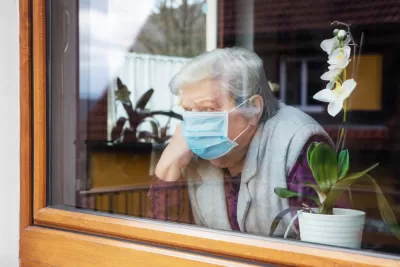A lack of affordable housing and access to services and amenities make it difficult for many seniors to remain in their long-term homes or communities.

A new study from the Harvard Joint Center for Housing Studies (JCHS) reveals “an acute lack of safe, affordable, and accessible housing options” for seniors hoping to ‘age in place.’ As Colleen Walsh explains in Harvard Magazine, “JCHS projects that U.S. households headed by someone more than 80 years old will number 17.5 million in 2038—more than twice the 8.1 million of 2018— accounting for 12 percent of all households.”
Jennifer Molinsky, who directs the JCHS’s Housing an Aging Society Program, says “When we talk about aging in place, we need to remember the home but also the larger place—does it have the amenities and transportation alternatives and walkability and opportunities to engage in the community that you might want or need?” In other words, Molinsky says, “it’s not only about the home and neighborhood, it’s also about ensuring access to the services and supports people need to stay safely there.”
Walsh describes several efforts by researchers, governments, and nonprofits to identify the challenges facing older adults and best practices and strategies for providing them with services and resources, which include listening to seniors themselves when trying to understand their needs. “The new report emphasizes the importance of involving older voices in planning a sustainable future for all seniors.” The report acknowledges the role of the pandemic, which “forced many people to reconsider the physical design, features, and accessibility of houses, apartments, and neighborhoods, including access to fresh air, green space, reliable elevators, and backup generators.” Molinski stresses the importance of housing as a primary factor in seniors’ health and well-being, shifting the focus away from a traditional healthcare-based approach.
FULL STORY: The Senior Housing Shortfall

Alabama: Trump Terminates Settlements for Black Communities Harmed By Raw Sewage
Trump deemed the landmark civil rights agreement “illegal DEI and environmental justice policy.”

Study: Maui’s Plan to Convert Vacation Rentals to Long-Term Housing Could Cause Nearly $1 Billion Economic Loss
The plan would reduce visitor accommodation by 25% resulting in 1,900 jobs lost.

Planetizen Federal Action Tracker
A weekly monitor of how Trump’s orders and actions are impacting planners and planning in America.

Wind Energy on the Rise Despite Federal Policy Reversal
The Trump administration is revoking federal support for renewable energy, but demand for new projects continues unabated.

Passengers Flock to Caltrain After Electrification
The new electric trains are running faster and more reliably, leading to strong ridership growth on the Bay Area rail system.

Texas Churches Rally Behind ‘Yes in God’s Back Yard’ Legislation
Religious leaders want the state to reduce zoning regulations to streamline leasing church-owned land to housing developers.
Urban Design for Planners 1: Software Tools
This six-course series explores essential urban design concepts using open source software and equips planners with the tools they need to participate fully in the urban design process.
Planning for Universal Design
Learn the tools for implementing Universal Design in planning regulations.
Caltrans
Smith Gee Studio
Institute for Housing and Urban Development Studies (IHS)
City of Grandview
Harvard GSD Executive Education
Toledo-Lucas County Plan Commissions
Salt Lake City
NYU Wagner Graduate School of Public Service





























